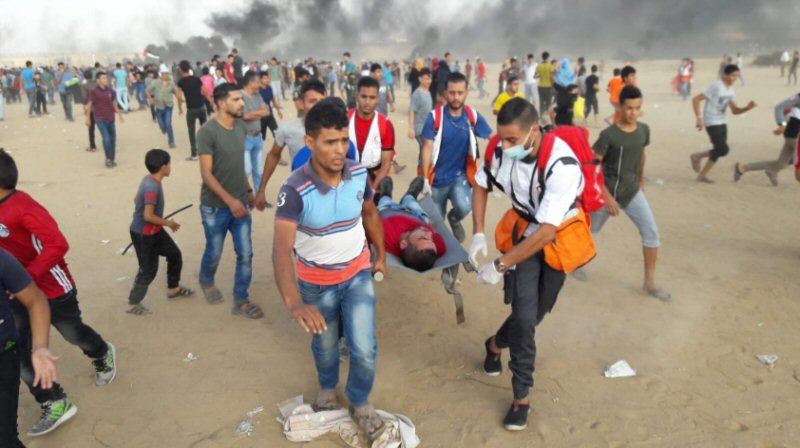~Doctors Without Borders/Days of Palestine
The vast majority of the 3,117 patients treated by Médecins Sans Frontières (MSF) between 30 March and 31 October – out of the total 5,866 the Ministry of Health says have been injured by live fire – had been shot in the leg. Around half suffered open fractures, with severe soft tissue damage to many of the rest.
These are complex and serious injuries that do not quickly heal. Their severity and the lack of appropriate treatment in Gaza’s crippled health system means that infection is a high risk, especially for patients with open fractures.
Gaza currently lacks the ability to properly diagnose bone infections, but from experience MSF expects that at least 25 per cent of patients with fractures are infected. Out of roughly 3,000 open fractures, this means it is likely that more than 1,000 patients are infected.
Based on a preliminary analysis of MSF’s patients in Gaza, we estimate that at least 60 per cent of the total number of injured patients treated by all health providers – a massive 3,520 people – will need further surgery, physiotherapy and rehabilitation.
A significant proportion of those patients will require some form of reconstructive surgery to properly heal, but untreated infections will prevent that from happening.
This burden is too much to bear for the health system in Gaza in its current form, weakened as it is by more than a decade of blockade.
Such a large number of injuries affects not just the injured; it also puts a strain on the provision of regular healthcare in Gaza.
The consequences of these wounds – especially if untreated – will be lifelong disability for many, and if infections are not tackled then the results could be amputation or even death.
Although MSF and other organisations are working hard to provide treatment for these patients, the scale of the needs is quickly becoming overwhelming, challenging our continued ability to respond.
The situation is also worsening as more people are shot, wounded flesh and bone dies, and the risk of infection increases.
An adequate response will cost tens of millions of euros – money that urgently needs to be found.
“MSF has already tripled its capacity in Gaza but the required volume of surgery, carefully managed antibiotics, intensive nursing care, and long-term physiotherapy and rehabilitation is staggering,” said Marie-Elisabeth Ingres, MSF’s head of mission in Palestine.
What is required now is:
- for the Israeli and Palestinian authorities to do all they can to facilitate the free access and work of all healthcare providers in Gaza that are trying to build the advanced capacity to care for these people;
- for other countries in the region and around the globe to step forward and offer funding and space in their hospitals where advanced surgical capacity exists; and
- for authorities in Palestine and Israel to facilitate the transfer of these patients abroad.
As Ingres concludes, “the alternative – that thousands of patients will be left to deal with terrible injuries, with many permanently disabled and dependent on their families – is unconscionable when adequate treatment is within the world’s grasp.”
Human Interest 11/29/18 Settler Attacks Increase at Al Mughayyir

